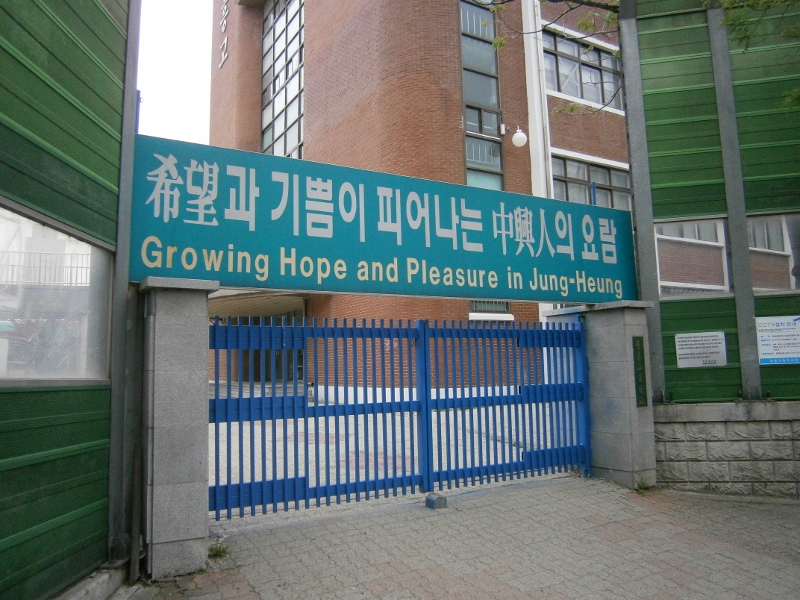This school is within the “New City” area of Bucheon, where I live and work. The school opened its doors to students for the first time in March 1994 (according to its website), before which this site was presumably farmland. A lot of nearby land was still being used as farmland into the late ’90s, I’m told. (The apartment building I live in was built only in 2004, and the building I work in was built in 2002.)
[Jung-Heung is the school’s name]
Written Korean, ever since the invention of the Korean script (“Hangul”) 600 years ago, has always been a mix of Hangul and Hanja, of Korean letters and Chinese letters, with wild variation in the shares of each in different eras. In the later centuries of the Chosun Dynasty (1700s, 1800s), I’ve read that it was fashionable among the educated to use only Chinese characters, and the native-Korean script was “for women and farmers”, or something. In the 1950s and 1960s, Chinese letters were still in heavy use, which is obvious from news-clippings and street photos from then.
I’m told that the government of General Park (1961-1979) led a deliberate campaign to get rid of Chinese characters in public life, which has succeeded. Most Koreans born after 1980 (or whenever) can read very few Chinese letters.
Translation Effort
- [Chinese Letters]: Hope (I ascertain this meaning only by process of elimination; I can’t read it)
- 과: and
- 기쁨: Pleasure, joy, delight
- 피어나: begin to bloom; begin to prosper; light up
- [Chinese Letters]: The name of the school, i.e. “Jung-Heung”
- 요람: Cradle, birthplace, as in “the cradle of civilization”
I think “Growing Hope and Pleasure in Jung-Heung” is a good translation.
Another could be “Where Hope and Joy Bloom”, or maybe “The Cradle From Which Hope and Joy Burst Forth”.


The first word is “hope” – you’re guess is right. I looked up a couple words I’ve tried to memorize for hope and one matched on the hanja:
희망 [希望]. Both hanja are tied to the meaning of hope (which is common in Chinese compounds), so it’s hope-hope = “aspiration.”
“Hope-hope”
Hopefully hoping?
I wonder what the logic in using that hanja. What % of people on the Korean street can recognize that hanja? I am guessing many, many more can get the meaning from English translation rather than from recognizing the Chinese character.